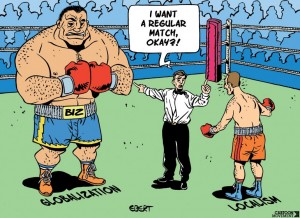
http://www.cartoonmovement.com/p/2881
- The concept of development emerged as a concern post WW2, emerged to target Africa, Asia, and Latin America to bring positive change, while simultaneously creating a silent division of the world. This silent division split the world into two categories: developed and underdeveloped (Rosy 2015).
- Harry Truman coined the term “underdeveloped” in 1949 to create the differentation between the “1st world” (industrialized, modern societies), and the “3rd world” (non-industrialized, traditional societies).
Rosy SY (2015) contributions of anthropology in bringing forth local perspectives and challenges in development processes. anthropol 2:140. doi:10.4172/2332-0915.1000140.
- Development in the larger context can be seen as a mechanism of globalization, that has changed in definition over time due to global capitalist expansion and persistence of colonial power over the “3rd world.” Many anthropologists including Rosy and Escobar argue that westernized power structures (“1st world”) over-generalize “3rd world” perspectives and indigenous knowledge to frame blanket policies in underdeveloped societies. In this over-generalization of the “3rd world,” modern development projects generalize all “3rd world” societies as poor and vulnerable, rather than considering them participants and directors in their own paths to development. In creating this division of developed vs. underdeveloped societies, “3rd world” non-material culture values are weakened as increase in material culture values occur. Through implementation of new technological advancement, development and modernization interrupt the non-material parts of knowledge, greatly impacting indigenous “3rd world” societies. As illustrated, there are complex issues surrounding modern development projects for the “3rd world” or “underdeveloped” societies. Rosy argues that local knowledge is needed because it creates local-specific development projects that cannot be attained through global development projects. Furthermore, the modernization and development process deteriorates traditional values, institutions, and practices like extended family, kinship, and communal control, replacing these with rational, scientific, knowledge which have largely resulted in barriers to development among other negative outcomes. This article provides a great argument for the incorporation of indigenous knowledge into development processes. Without romanticizing indigenous knowledge, I argue that in the least indigenous knowledge is knowledge that cannot be attained through an outsiders perspective, that is “experimenting through living,” and should be at least taken into consideration when creating development projects. While it is important to have global participation and cooperation concerning development projects of the “3rd world,” the state/local levels must have control over their own economies to create the most benefit for citizens.
*See abstract filing cabinet for further information: Smallholders, Householders, Robert Netting, Ester Boserup’s theory of agrarian change: a critical review by David Grigg